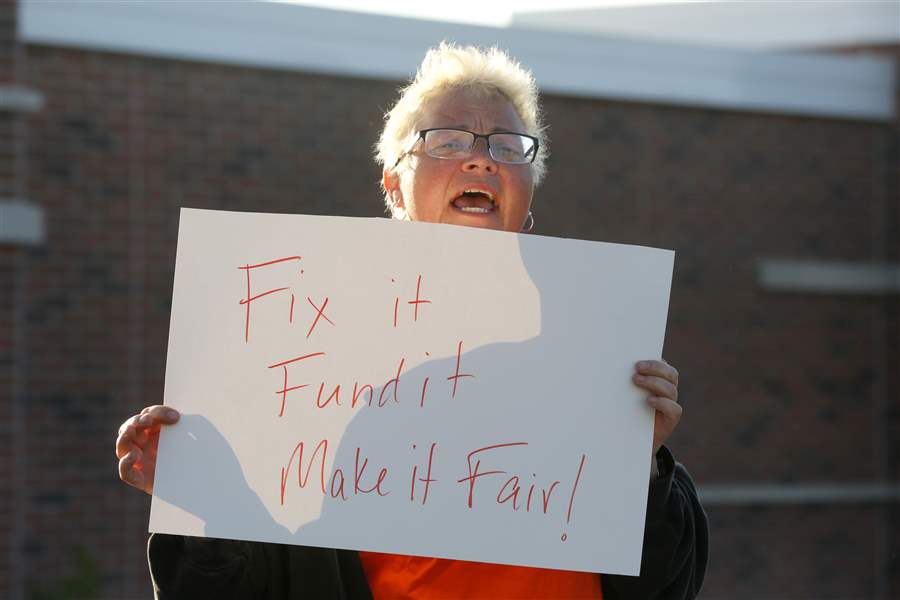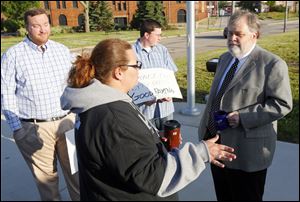
Transit workers protest outside TARTA garage
Funding system, stalled contracts with paratransit workers at issue
6/5/2014
Shannon Conway, a fix line employee of TARTA, holds a sign during an Amalgamated Transit Union protest and rally outside of the Toledo Area Regional Paratransit Service headquarters on Knapp Street.
The Blade/Amy E. Voigt
Buy This Image

Shannon Conway, a fix line employee of TARTA, holds a sign during an Amalgamated Transit Union protest and rally outside of the Toledo Area Regional Paratransit Service headquarters on Knapp Street.
A transit funding system they consider "antiquated" and stalled contract talks for paratransit workers were both subjects for protesters who gathered today outside a Toledo Area Regional Transit Authority garage and administrative office.
"Fix it, fund it, make it fair," was one of two chants for the group of about a dozen people, mainly members of Amalgamated Transit Union 697, in front of the Toledo Area Regional Paratransit Service facility on Knapp Street.
Carly Allen, the union's business agent, said that slogan referred to the transit authority's two property levies, a combined 2.5 mills collected in its seven member communities that provides the bulk of the agency's local non-fare funding.
Mrs. Allen said local leaders need to take another look at switching to sales-tax funding, which would be "more equitable and pay-as-you-go" compared to property taxes, whose revenue has slumped during the past five years as area real-estate values have tumbled.
"It's time. We really need to move in that [sales tax] direction," Mrs. Allen said. "Our working families are paying the price for reactive leadership."
Perrysburg's relatively high share of property taxes was a main reason that city withdrew from the transit authority two years ago, with leaders complaining that their community did not receive service commensurate for the amount it paid in to TARTA. Spencer Township, the transit authority's smallest member, pulled out last year for similar reasons, leaving the agency with seven member communities.

TARTA General Manager James Gee, right, listens to Carly Allen, left, Business Agent with the Amalgamated Transit Union 697, during an Amalgamated Transit Union protest.
But when the transit authority proposed four years ago to add Lucas County as a member community -- a prerequisite step toward enacting a county-wide sales tax -- Sylvania Township trustees and Maumee city council rejected the idea. State law requires existing members to approve any membership additions.
"The existing member communities do need to get on board," Mrs. Allen said. "I just hate to see one group make our entire region suffer. It [a sales tax] at least needs to go to voters."
James Gee, the transit authority's general manager, said TARTA leaders would probably approach Sylvania Township and Maumee first to reconsider their positions before renewing any efforts to switch to a sales tax.
One likely change from four years ago, Mr. Gee said, is that a quarter-cent sales tax could now be proposed instead of the half-cent tax previously recommended.
Recent TARTA service reductions -- in response to the Perrysburg and Spencer pullouts and, even more significantly, the Toledo Public Schools' budget-related elimination of most student transportation -- have shrunk the agency's operations enough that a quarter-cent tax would now match its property-tax revenue, he said.
While TARTA operations have shrunk, the paratransit service has grown rapidly in recent years because of rising demand from riders whose disabilities limit or preclude their use of regular-route buses.
TARPS drivers and mechanics, who are paid less than their TARTA counterparts, have been without a labor contract since 2011. Along with pushing for higher paratransit wages in a new contract, ATU has complained that understaffing results in unpredictable forced overtime for its members.
A better working environment will also reduce TARPS' employee turnover, now 31 percent annually, said Anthony Garland, an ATU international representative who participated in today's protest. Such high turnover is "a safety issue" for the paratransit operation, Mr. Garland said.
Mr. Gee invited Mr. Garland and other union leaders to meet with him after a TARTA board of trustees meeting today to resume negotiations. The protesters attended the meeting.
Compensation issues may be partly responsible for TARPS' high turnover, the transit manager said, but with most resignations occurring after employees have been on the job for a month or less, officials believe many starting drivers leave because the work is more demanding than they expected.
"It's a difficult job. You need to have excellent driving and customer-service skills," he said.
Mr. Gee said the transit authority and its unions need to work together on the revenue issue.
"If you want to do a grassroots effort, get us involved -- we'll be there," he told Mr. Garland.
Contact David Patch at: dpatch@theblade.com or 419-724-6094